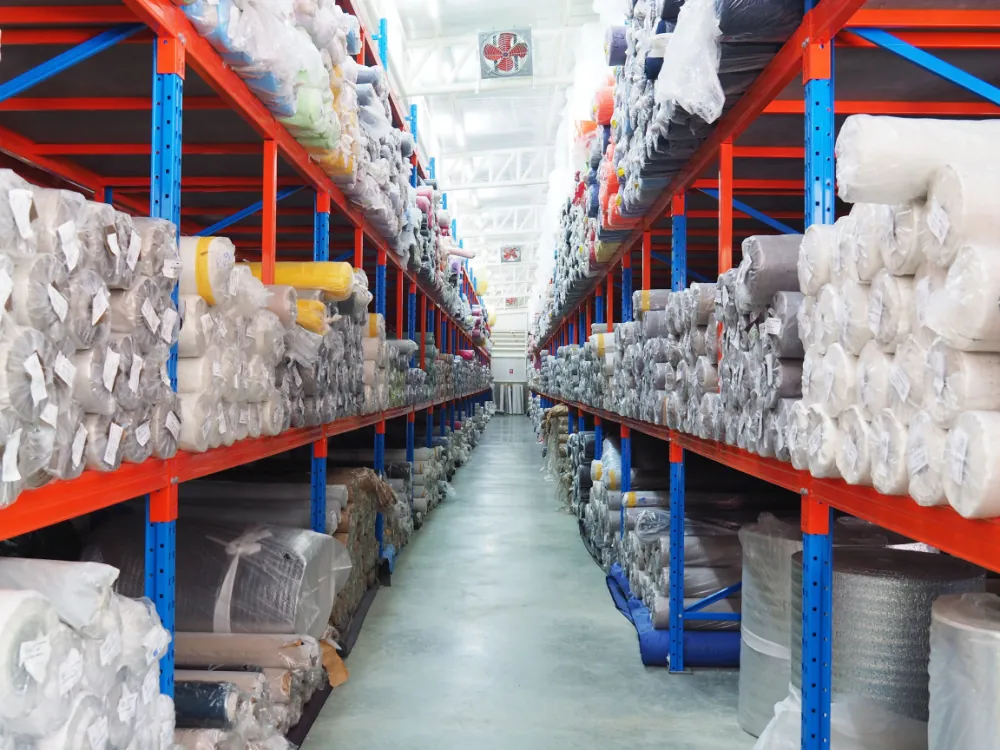
Shipping Textiles and Fabrics
Ship your Textiles with Care
FreightCenter specializes in transporting everything from delicate silks to industrial rolls of upholstery fabric. Whether you’re a fashion house, manufacturer, or eCommerce brand, our tailored freight solutions ensure your textiles ship safely, on time, and within budget.
Shipping Textiles and Fabrics Starts Here
You’ve got fabrics to move—we’ve got the freight know-how to get them there. Whether it’s rolls of cotton, stacks of swatches, or pallets of upholstery, FreightCenter makes shipping textiles and fabrics easy, affordable, and reliable. We work like an extension of your team, finding the best carriers, managing the paperwork, and making sure your goods arrive in perfect condition. No stress, just solid shipping solutions from people who get it.
Thousands of businesses trust FreightCenter to move their freight faster, smarter, and cheaper! From unbeatable rates to top-notch service, our customers are raving about their shipping success.
See why they keep coming back!
Award-Winning Service, Trusted by Shippers Everywhere!
- 2021, 2017 & 2016 Food Logistics’ Top Green Providers
- 2021 & 2018 Supply & Demand Chain Executives’ Pros to Know: Matthew Brosious
- 2020 & 2019 Top Food Logistics’ 3PL & Cold Storage Provider Award
- 2020 & 2019 Business Observer’s Top 500 Companies on the Gulf Coast
- 2020 & 2017 SmartWay® Transport Partner
- 2020 & 2017 Food Logistics’ Champions: Rock Stars of the Supply Chain
- 2020 Best of Palm Harbor Awards for Local Businesses
- 2017 Green Supply Chain Award from Supply & Demand Chain Executive
- 2017 Tampa Bay Business Journal Heroes at Work
- 2016, 2015, & 2012 Food Logistics Top 100 Software and Technology Providers
- 2013 Tampa Bay Business 100 by Tampa Bay Business Journal
- 2013 Top 100 Great Supply Chain Partners by SupplyChainBrain
- 2012 TIA Samaritan Award Honorable Mention
- 2012, 2011 & 2010 TBBJ Fast 50 Recipient
- 2013, 2011, & 2010 Diversity Business Top Businesses

Why Choose FreightCenter for Shipping Textiles and Fabrics?
We act as an extension of your logistics team—no fluff, just expert freight support. With 25+ years of experience and a network of fabric freight pros, we help you manage every step of your shipment:
-
Moisture-sensitive freight planning
-
Proper freight class identification
-
Real-time tracking and personal support
-
International, expedited, and white-glove services
-
Packaging and insurance guidance
Special Steps to Ship Sensitive Fabrics
When shipping valuable or fragile fabrics—such as silk, lace, embroidered textiles, or antique materials—extra precautions must be taken to prevent damage during transit. These fabrics should be individually wrapped in acid-free tissue paper to avoid creasing, abrasion, or color transfer. If shipping on rolls, the fabric should be rolled on sturdy tubes and covered in plastic sheeting or moisture-resistant wrap to guard against water damage. For folded items, using soft padding inside the folds can help prevent permanent creases or pressure marks. It’s also recommended to place wrapped fabrics in sealed plastic bags before boxing, offering an additional layer of protection against humidity and contaminants.
The outer packaging is just as important. High-value fabrics should be placed in reinforced, double-walled boxes or custom crates depending on size and weight. Empty spaces inside the container should be filled with foam, air pillows, or other cushioning materials to prevent shifting during transport. Labels such as “Fragile,” “Do Not Stack,” and “Keep Dry” should be clearly visible on all sides of the box. For especially valuable shipments, consider insuring the package for its full value and using tracking services that provide real-time updates. Partnering with a freight provider like FreightCenter ensures access to carriers that specialize in delicate shipments and understand the importance of careful handling every step of the way.
To create value for our customers by delivering customized textile shipping solutions that meet their unique needs and to fulfill shipping demands from simple to complex with expertise, guidance and ingenuity.
If you’re shipping smaller batches of textiles or fabrics, Less-Than-Truckload (LTL) freight shipping is an ideal choice. This cost-effective method allows your shipment to share space on a truck with other freight, making it perfect for transporting bolts of fabric, finished garments, samples, or smaller textile inventory. Whether you're a designer, wholesaler, or retailer, FreightCenter’s network of trusted LTL carriers ensures your fabric shipments are handled with care and delivered efficiently, all while helping you keep shipping costs under control.
For larger textile shipments—such as bulk fabric rolls, warehouse stock replenishments, or production inventory—Full Truckload (FTL) shipping is the best solution. FTL offers a dedicated truck exclusively for your shipment, minimizing handling and reducing the risk of damage or contamination. This method is ideal for mills, manufacturers, or distribution centers moving high volumes of cloth, upholstery, or apparel. FreightCenter tailors FTL shipping solutions to meet your specific needs, ensuring your fabrics arrive safely, securely, and directly at their destination.
Need your fabrics or textiles delivered fast? Whether you're facing a production deadline, shipping to a trade show, or restocking a retail location, FreightCenter offers expedited freight shipping to meet tight schedules. Our expedited services include priority handling and real-time tracking, ensuring your shipment—whether bolts of fabric, custom prints, or finished goods—arrives on time and intact. Count on us when time-sensitive delivery is essential for your business success.
For rare, valuable, or delicate fabrics—such as antique textiles, couture garments, or limited-edition prints—specialized freight shipping provides the protection they require. FreightCenter offers white-glove services, climate-controlled transport, and enhanced security options for fragile or high-value textile shipments. Whether you’re a museum curator, fashion house, or specialty retailer, our custom freight solutions minimize handling and ensure your fabrics are transported with the highest level of care, complete with insurance and secure delivery options.


FreightCenter is Here to Get You Sewing!
Ready to Ship Fabric the Smart Way?
FreightCenter understands the importance of delivering your fabrics safely and on time. With over 25 years in the logistics industry, we are dedicated to providing the best shipping experience while keeping your costs low. We partner with over 50 carriers nationwide, allowing us to offer discounted rates that you won’t find anywhere else. Our tailored solutions include expedited shipping, white-glove services, and specialized freight options, ensuring that your linen, nylon, wool, chiffon, and sateen arrive in perfect condition.
For added value, repeat customers can earn points for exclusive rewards every time they ship with us!
Ready to ship your fabrics? Our expert agents are here to help you find the best shipping solution for your needs. Get a free freight quote using our online tool, or call us at (800) 716-7608 today!
Frequently Asked Questions about Shipping Textiles and Fabrics

Q. What’s the best way to ship rolls of fabric?
The best method for shipping fabric rolls is to secure them on sturdy tubes and wrap them in moisture-resistant plastic. Depending on quantity and destination, you can ship them via LTL (Less-Than-Truckload) or FTL (Full Truckload) freight. FreightCenter can help determine the most cost-effective and safe shipping method for your fabric rolls.
Q. Can I ship folded fabrics instead of rolls?
Yes, you can ship folded fabrics, especially for smaller quantities or delicate textiles. Be sure to pad between folds to prevent creases and wrap the fabric in protective material to guard against moisture and dirt.
Q. How should I package delicate or high-value fabrics?
Wrap delicate fabrics in acid-free tissue paper, then place them in sealed plastic bags to protect against humidity. Use a sturdy box with ample cushioning material, and clearly label the package with “Fragile” or “Keep Dry” instructions.
Q. Do I need a pallet for textile shipping?
Pallets are often recommended, especially for large shipments or multiple boxes/rolls. Palletizing helps stabilize the load, making it easier to handle and reducing the risk of damage. FreightCenter offers guidance on proper pallet preparation.
Q. What freight service should I use for large textile shipments?
For large or bulk textile shipments, FTL freight is typically best. It allows your goods to travel on a dedicated truck, minimizing handling and risk. FreightCenter arranges custom truckload options suited to textile and fabric transport.
Q. Is LTL freight shipping suitable for small fabric shipments?
Yes! LTL is ideal for smaller loads of fabric, such as a few rolls, boxes of garments, or sample orders. It’s more cost-efficient since you’re sharing space with other freight. FreightCenter’s network of LTL carriers makes it easy to compare rates and service levels.
Q. How do I protect fabrics from moisture during transit?
Always use moisture-resistant packaging such as plastic wrap or sealed poly bags. For added security, consider desiccant packs inside boxes or crates. Proper labeling (like “Keep Dry”) also helps carriers handle the shipment appropriately.
Q. Can I ship textiles internationally?
Yes, textiles and fabrics can be shipped internationally. Make sure to include all necessary customs documentation, including commercial invoices, country of origin, and product descriptions. FreightCenter can assist with international shipping and customs clearance. For more info on shipping internationally, you can visit the DOT site here.
Q. Are there restrictions on shipping certain types of fabrics?
Some countries may have import restrictions or require additional documentation for items made of wool, fur, or treated fabrics. It’s important to check destination-specific regulations before shipping.
Q. How much does it cost to ship textiles or fabrics?
Shipping costs depend on weight, dimensions, distance, and freight mode. Additional services like residential delivery or lift-gate use may also impact the price. FreightCenter offers instant freight quotes and helps you compare carriers to get the best rate.
Q. What if my fabric shipment is time-sensitive?
For urgent deliveries, expedited freight shipping is available. FreightCenter provides priority handling and faster transit times to ensure time-critical fabric shipments arrive on schedule.
Q. Do I need insurance when shipping valuable fabrics?
It’s highly recommended. Insurance protects your shipment against loss or damage during transit. FreightCenter offers optional freight insurance that can be added when booking.
Q. Can I ship custom-printed or specialty textiles?
Absolutely. Whether you’re shipping dye-sublimated prints, embroidered fabric, or other custom textiles, proper packaging and labeling are key. FreightCenter can help match you with carriers familiar with handling specialty goods.
Q. What happens if my textile shipment is damaged?
If damage occurs, take detailed photos immediately and file a claim with the carrier. If you booked through FreightCenter, their support team can help you with the claims process and provide documentation guidance.
3 Unique Tips for Shipping Textiles and Fabrics

Group Fabrics by Weight and Type to Prevent Damage in Transit
When shipping multiple fabric types, avoid mixing heavy and light materials in the same box or roll. Heavier textiles like canvas or denim can crush delicate ones like silk or organza if stacked together. Instead, group items by weight and fiber type. This not only protects fragile inventory but also helps when filing insurance claims, as it clarifies the value and nature of each item in the shipment.

Use Compression Packaging for Bulk Yardage to Cut Costs
Textiles are one of the few products that can safely be compressed without compromising quality (if packaged properly). Use vacuum-sealed or tightly rolled compression packaging to reduce volume and dimensional weight charges—especially helpful when shipping via LTL. Just be sure to label packages so carriers don’t stack them improperly.

Request a Freight Class Re-Evaluation for Densely Packed Textiles
Freight rates are often tied to freight class, and textiles can fall into higher, costlier classes due to perceived bulkiness. But if you pack fabric densely and efficiently, you may qualify for a lower class—saving money. Carriers or brokers like FreightCenter can help submit a density-based freight class re-evaluation, which could significantly cut your shipping costs for large orders.


